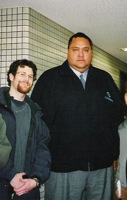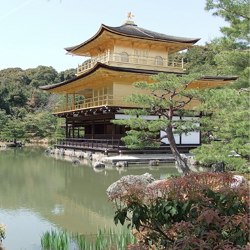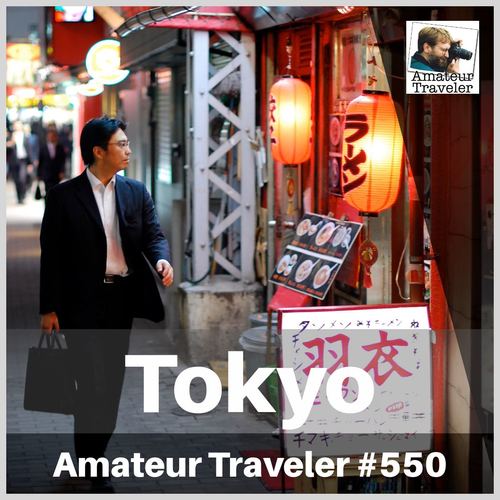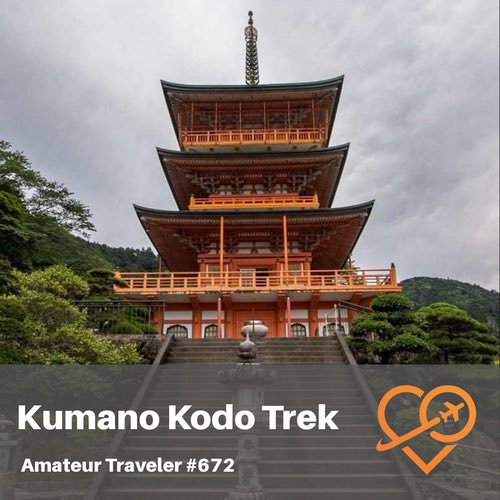Teaching English in Japan – Episode 77
categories: asia travel
The Amateur Traveler talks to Andrew who spent a year teaching in Osaka Japan about traveling to and living in Japan: teaching, Osaka, Kyoto, Nara, Namba, Umeda, Mt Fuji, bars, capsule hotels, shopping, baseball and meeting Akebono the former Sumo wrestling champion.
click here to download (mp3)
click here to download (iTunes enhanced)
News
Toddler’s temper ousts family from plane
Israir Airlines Introduces the ‘Sky-Torah’
DOT: Virgin America is not American enough
Let VA Fly
Show Notes
Japan
Embassy of Japan
TELF.com (Teaching English as a foreign language)
Osaka
Akebono (sumo wrestler)
Kyoto
Nara
Namba area of Osaka
Umeda area of Osaka
Mt Fuji
In Search of Tranquil Japan by Andrew
Internet
globechatting.com
Community
write a review and maybe win an Amateur Traveler mug
Voicemail from Barbara
Letter from Brigid
Discussion Boards
Song
Calendars and Maps from Tara Leigh Cobble
+Chris Christensen | @chris2x | facebook
7 Responses to “Teaching English in Japan – Episode 77”
Leave a Reply
Tags: audio travel podcast, japan, podcast

 Travel to Kyoto, Japan – Episode 297
Travel to Kyoto, Japan – Episode 297 Travel to Tokyo, Japan – Episode 550
Travel to Tokyo, Japan – Episode 550 Japan Vending Machines
Japan Vending Machines Kumano Kodo Trail in Japan – Episode 672
Kumano Kodo Trail in Japan – Episode 672


Wes
Says:January 30th, 2007 at 5:39 pm
No sympathy at all for the AirTran family. They had plenty of time to get their kid under control. Unbelievable that they would expect an airline and all of those passengers to be held hostage by one child. The airline offered comp, which I thought was more than generous.
I’ve seen comments on this same story. I’ve yet to see anyone side with the family yet.
Bebe
Says:February 1st, 2007 at 2:36 pm
Hey, you’re featured on Podcast Alley’s main page!
Woo-hoo, go you!
iConjohn
Says:February 2nd, 2007 at 8:03 pm
A 3 year old? Why even discuss it. I never saw the insides of a plane till I was 21. Great for the airline!
JCH
Mailys
Says:February 7th, 2007 at 6:46 am
I have been travelling since I was 3 and my friend takes her 3 children under 5 on planes. She alone is able to manage to get her 3 year old in addition to the 2 others in their seat for take off. Sorry, if she can manage – her kids are adorable, but don’t often listen – then so can parents with 1 child. Airlines should say if you aren’t in your seat in 3 minutes then we will have to leave without you! (don’t know if they said that or not!)
GxS
Says:February 9th, 2007 at 2:56 pm
Good for the airlines. If I had been on the plane, I would have aplauded.
Sam
Says:February 16th, 2007 at 11:50 pm
I currently live in Japan (and have been here for about 8 years now). While listening, there were a few things that Andrew said that I really wanted to clarify/correct.
Working holiday visa
The US does not participate in this program. The time period of a visa varies between 6 months to one year (with extensions up to a year and a half), depending on what country you’re from. Wikipedia has a brief summary with the list of participating countries:
http://en.wikipedia.org/wiki/Working_holiday_visa
If your country has an agreement with Japan, you can receive a tourist visa upon entry which is good for 90 days.
If you want to change from a tourist to working visa, you will need to leave Japan once and re-enter. Many people fly to Korea to do this.
Requirements to work in Japan
Andrew said in his commentary that most language schools require a college degree. This is partially true… (If you’re in Japan on a working holiday visa, you can probably find a job at an English conversation school without having a college degree.) The reason for requiring a college degree is the Japanese government will not grant you a working visa if you don’t have a bachelor’s degree.
Finding work after arriving in Japan, is fine, but you should be careful. Sometimes smaller schools do not understand all of the requirements of the government, and you could end up in trouble yourself. Factors such as visa type/sponsorship, taxes, insurance are all areas where Japan is fairly strict and you could have trouble when leaving the country.
For example, your first working year in Japan, you do not pay local income tax. Your second year here, you will begin paying tax based on your first year of work. If you leave the country at the end of one year, you have to pay the entire year of local income tax.
If you want to come to Japan and work for a year, there are a few big English conversation schools that hire from overseas. AEON, GEOS, NOVA. AEON and GEOS are fair and most teachers complete and renew their contracts for a short period of time. NOVA is not a good place to work. Many foreigners in Japan say it stands for “no vacation” and I know many teachers who did not complete their contracts because of difficulties.
What you’ll find with these schools, though, is that they are a kind of machine. The minimum initial contract is one year. If you complete your contract, the school will give you a bonus and a return air ticket (or the equivalent cash). There is not much room for change and improvement, but for the most part they are fair and they know all of the laws and you can count on them to take care of you. They’re good for a year, two at the most, but any longer than that and you’ll probably find yourself burning out from lack of new ideas. To put it simply, if a good friend wanted to come teach English in Japan for a year or so, I would highly recommend AEON, and say to stay away from NOVA.
One other program is a government sponsored program called JET. http://www.jetprogramme.org/ This is a government sponsored program where you teach English in public schools.
Mat Heating
Says:August 20th, 2010 at 12:16 am
Teaching English in a foreign country is one of the ways i have been looking at for to support myself if i am to travel to a European country. Great idea.
As for kids whose parents have not been able control them, especially when around so many other people, it really doesn’t say much for their parenting skills.